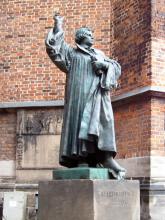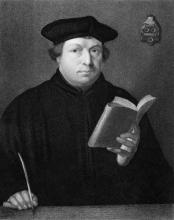reformation day

Some Protestant churches mark the day as Reformation Sunday, and celebrate it on the Sunday just before, or just after, Oct. 31. More often than not, the hymns sung in church that day include “A Mighty Fortress Is Our God,” with words and music composed by Luther himself. But most members of Lutheran churches — the direct descendants of Luther’s movement — wait until Oct. 31. And that, as we know, is also Halloween, and has led to some creative celebrations for kids.

Oct. 31 is approaching quickly — a day marked throughout the United States by costume contests, pumpkin carvings, and children knocking on neighbors’ doors with questions of “trick or treat?”
But for Protestant churches around the world, Oct. 31 is also a celebration of a grown man knocking on a (rather large) door, asking a different question of the Catholic Church:
From whom does salvation truly come? And a follow-up: How do we refocus the church on the Gospel?
On this date, almost 500 years ago, Martin Luther hammered his 95 Theses onto the front doors of All Saints’ Church in Wittenberg, Germany — an act that, unforeseen by Luther at the time, is now credited with beginning the Protestant Reformation. Luther’s 95 Theses outlined his abstentions to the practice of selling indulgences to guarantee Christians salvation, emphasizing that grace is given by God alone and can only be assured by the clergy, not bought from them.
With the help of the social media of his day — the newly-improved printing press — news quickly spread to people throughout Europe that Martin Luther was questioning the papacy and attempting to refocus the church’s theology on forgiveness through the word and the eucharist, neither of which required financial prosperity. Within a few years, Martin Luther was excommunicated from the Catholic Church for his continued teachings, which included suggestions that the Bible should be accessible to all people and that priests not necessarily need to be celibate.
The Reformation gathered Christians from across Europe into a community of “rebels,” from which multiple denominations would spring up over the next half a century.
Today, 498 years later — with of a Catholic pope nicknamed “The Peoples’ Pope,” who is on Twitter and preaches about income inequality — what would Luther think of the state of the church?

Today is the day we remember the Protestant Reformation. On Oct. 31, 1517 Martin Luther, my denomination’s namesake, nailed his 95 Theses on the church door in Wittenburg. It was the beginning of a new movement that brought many changes to the Christian church. Perhaps the change I am most thankful for (other than a new awareness of justification by faith alone, simul iustus et peccator, and imputed righteousness of course) is that the Reformation paved the way for the Bible to be placed in the hands of the people. Before Luther’s German translation was completed in 1534, which happily coincided with advancements in the printing press, it was virtually impossible for any non-clergy Christians to get ahold of, much less read, the book we take for granted.
Individual faith and the ability to study this book for ourselves is a benefit we don’t even stop to consider. I grew up with more Bibles in my home than we could ever use and have countless different versions now in my office. And yes, there are still some places where access to information and printed text is hard to come by, but at least here, God’s Word is always at our fingertips, if we want it to be.

DURHAM, N.C. — Protestants have traditionally celebrated Oct. 31 as the anniversary of the start of the Protestant Reformation, a movement that divided Western Christendom and gave birth to such diverse religious groups as Lutherans, Presbyterians, Anglicans, and Mennonites.
On Oct. 31, 1517, an Augustinian friar named Martin Luther nailed 95 theses for debate on the door of the Castle Church in Wittenberg, Germany, and so sparked a religious reform even he could not control.
But Luther's public life actually began five years earlier, 500 years ago this week, on Oct. 19, 1512, when he finished his formal theological education and was installed as a professor of Bible at a relatively new and still nonprestigious Catholic university in Saxony.
No one, least of all his patrons, expected this soft-spoken young man with a tenor voice and a bubbling sense of humor to turn into a religious bomb thrower, whose theological convictions would alter the religious and political structures of Europe for five centuries. Indeed, no one could have been more astonished by this unexpected development than Luther himself.